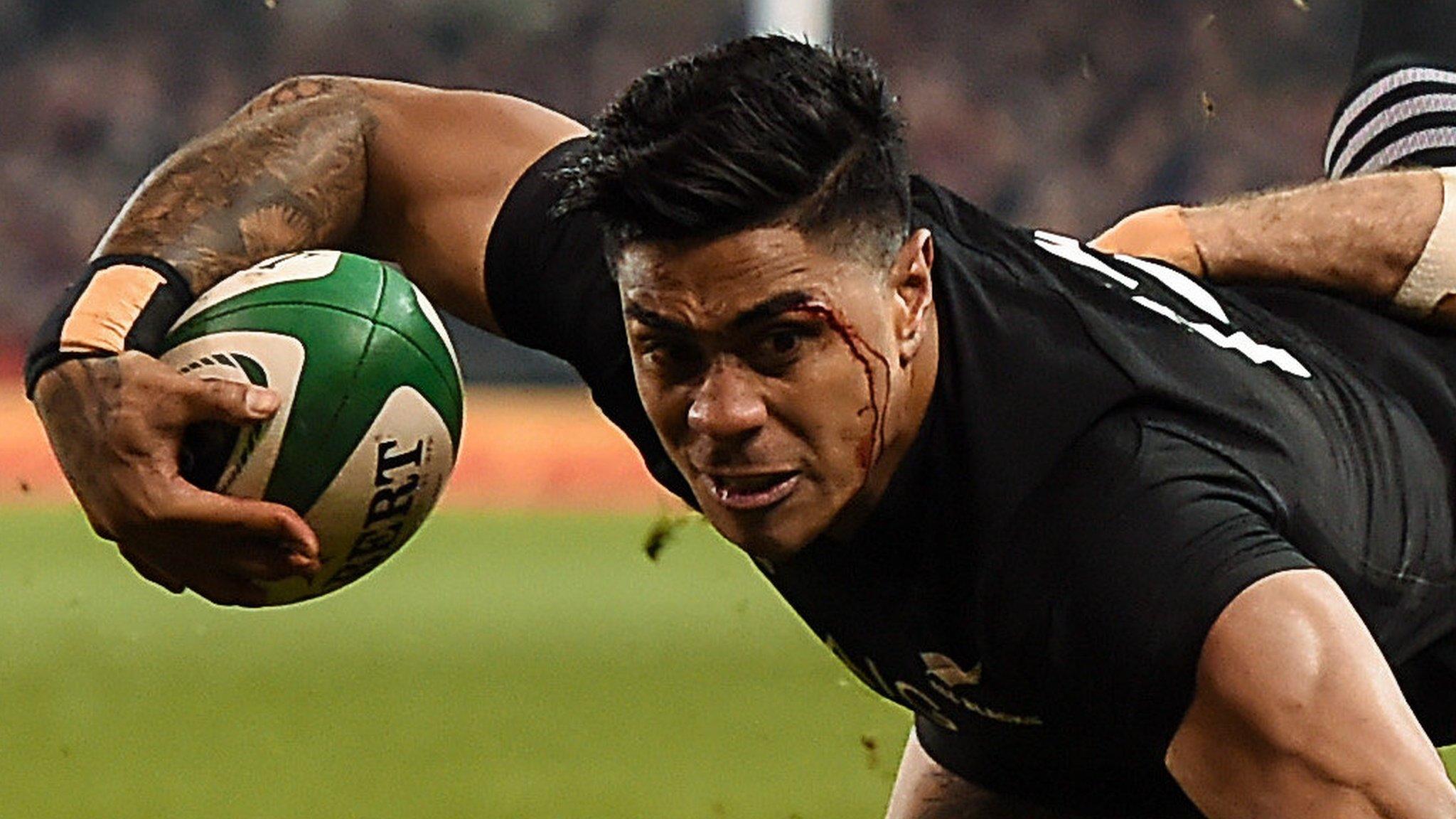Jeremy Guscott on New Zealand's win over Ireland, plus England, Scotland & Wales
- Published
- comments
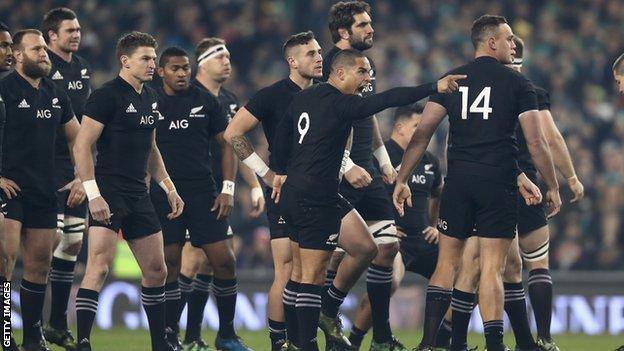
New Zealand avenged their shock defeat by Ireland two weeks ago as they won a brutally physical contest in Dublin
The autumn Tests on Saturday saw New Zealand avenge their Chicago loss to Ireland, while England hammered Fiji and Wales and Scotland both earned narrow wins, over Japan and Argentina respectively.
Former England and Lions centre Jeremy Guscott, fresh from being inducted into the World Rugby Hall of Fame, external this week, analyses the action.
All Black ferocity
World champions New Zealand play everything at an incredible intensity. They understand the laws of the game, where the boundaries are and how the referee might react. They use it to their advantage.
But on Saturday Ireland couldn't beat a side who were playing with 14 men for 20 minutes. You have to say they should have won the game.
Referees need to look harder at New Zealand - their speed and intensity means the game moves so quickly, but they are canny. The All Blacks have to watch their high tackles - they have got a reputation for it and have had two players cited from Saturday - but for all that, you can't blame the players.
I'm not one who thinks their players go out there to hurt anyone illegally, they are sportsmen and do their best. There is ferocity in everything they do and they take everything to the limit, but it is up to the referee to be better at seeing and penalising them.
Would a Cane yellow have made a difference?
There are a few incidents everyone is talking about from the game, mainly the high tackle by Sam Cane on Robbie Henshaw. Your view of how that decision went depended on what side of the equator you are on.
If Cane had been sin-binned you could not have argued. For me, what determined that was a yellow card was that it was shoulder first. His left arm seemed to be angled behind his shoulder and he hit Henshaw's head. The bigger argument is, would it have made a difference to the game?
New Zealand had two yellow cards in the game and Ireland did not take advantage as well as they did two weeks ago, when they beat the All Blacks for the first time in 111 years of trying. They could not get across the line in Dublin.
A couple of tries really did go begging - that is the difference when playing a team with New Zealand's class between winning and losing. Ireland showed you can't make any mistakes and have to take every chance.
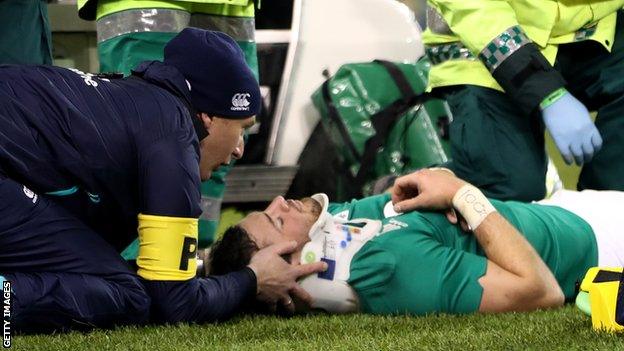
Ireland centre Robbie Henshaw was forced off early on after a controversial high challenge by Sam Cane
Ireland proved they can match the All Blacks
However, it was still an outstanding performance by Ireland, they did better than most teams have done over the past 12 months.
It shows me that if you can reach New Zealand's intensity and fitness levels then you can challenge them and Ireland proved it - but they will always struggle to match them when it comes to skill levels.
Ireland proved worthy opponents and could have won the game in Dublin.
The hosts saw players forced off and they were deep into their reserves, yet everybody came on and no-one let anyone down - they were superb.
They found another star in centre Garry Ringrose, flanker Josh van der Flier was sensational, fellow flanker Sean O'Brien is coming back to fitness, Jared Payne was exceptional playing at centre against the country of his birth, while number eight Jamie Heaslip was almost reborn.
Heaslip has been quite average for the past couple of seasons - England's Billy Vunipola and Wales' Taulupe Faletau have both superseded him - but this time I saw him running with the ball and making more metres than normal, which is great.
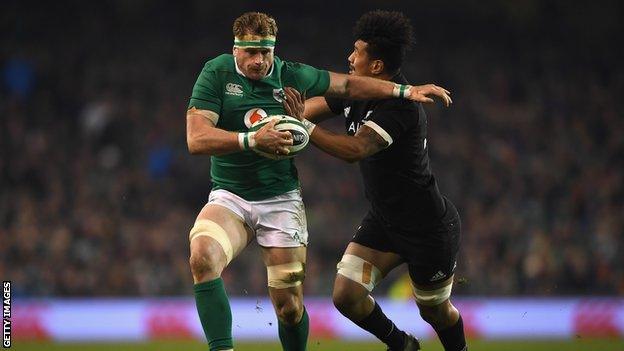
Heaslip carried 14 times and gained 32 hard-fought metres during the game
Ireland will be favourites when they play Australia next Saturday. They have shown they can do it against New Zealand, so why can they not do it every time? That will be the challenge.
When Ireland won the Six Nations in 2014 and 2015, they had found themselves a game plan which they executed to perfection, but then they got worked out and did not seem to have an alternative plan.
Irish players looked lost during World Cup year but they did well in South Africa this summer - they should have won the series - and in 2016 they are definitely back.
Wales lacking the fizz, bang, wallop
Last-gasp drop-goal gives Wales narrow win
Wales were playing a Japanese second XV who were missing many players from the wonderful team that beat South Africa in the World Cup.
Japan are a side in transition, whereas Wales are a mature, experienced, Grand Slam-winning side with plenty of Lions. They were the top try scorers in the Six Nations this year and put in two really good performances in New Zealand during the summer.
But they have yet to turn up this autumn and the intensity is not there.
It is hard to try to fathom what's happened. Looking at the game statistically, you struggle to understand how they have not won by 20 points, as they had 63% possession and 68% territory.
But they conceded 18 turnovers and a team that once prided themselves on defence are really struggling in that area. In addition, a side that swaps and changes its half-backs are a side that for me will lack any continuity in whatever they are trying to execute on the field.
Wales are not getting enough explosive ball carriers onto the ball, like England's Vunipola brothers or Maro Itoje. Against Japan it was low in intensity and low in fizz, bang, wallop. It was a tepid performance.
Wales appear to be stale, they have got to jazz things up and they need a rejig.
Scotland haven't gelled yet
Highlights: Scotland 19-16 Argentina
I am pleased Scotland won but it was a pretty average game of rugby, nothing to scream and shout about. They played reasonably poorly and got a result, while Argentina just played poorly.
This might be both a small and a big victory against Argentina at the same time. It is big because Argentina have a reputation, but small in terms of their performance.
I'm looking at the Scotland team and I am impressed by the quality of their players, but they are taking longer than I thought to gel and come together.
If you go back to the last-gasp World Cup defeat by Australia, in rugby terms the Wallabies were all over Scotland. That scoreline reflected Scotland's tenacity rather than their ability to take a team apart.
There have not yet been signs that they believe they can take a team apart. Until they have that moment, their confidence will always been breakable.
Look at players like Stuart Hogg, Tommy Seymour, Finn Russell, Jonny Gray, the experienced Ross Ford and Tim Visser.
They will believe they can be part of a team that will sparkle at some stage, but they will be incredibly frustrated they are not doing it yet, it is all there for them.
It is difficult to understand why Scotland have not got it together, maybe the coaching message is not getting across or the players are making too many errors or poor decisions.
England players had a power cut
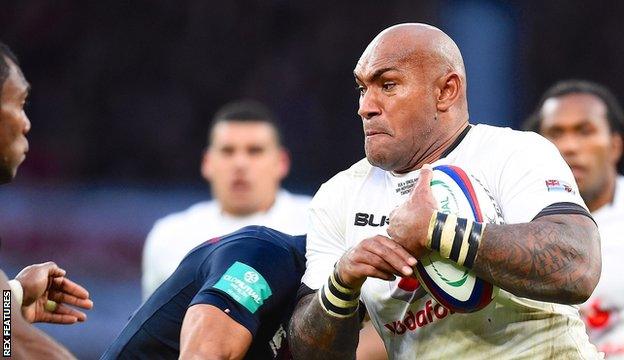
The 20-stone winger Nemani Nadolo scored the first of Fiji's three tries in 12 minutes against England
England head coach Eddie Jones said it was a game he expected to win, and they duly did, but he would have preferred to have won conceding none or maybe one try.
The way England let Fiji come back into it near the end of the first half and beginning of the second half was like someone had switched the intensity off.
There was a power cut in the England players' minds for 12 minutes and they conceded three tries. That is what Eddie will warn them about the most. You can have a power cut against Fiji, but not have one against the better teams because you are likely to lose.
I do not believe anyone went backwards in the pecking order on Saturday. Bath winger Semesa Rokoduguni took his chance, although on a couple of occasions he was a little bit out of position defensively, and Saracens' Alex Goode did himself no harm at full-back.
Fly-half George Ford is playing well, but the Bath 10 can play so much better.
I want to see Worcester centre Ben Te'o starting at 12. The Owen Farrell-George Ford combination works well enough but I would like to see another impact runner in the back line. At the moment it is not bulky enough.
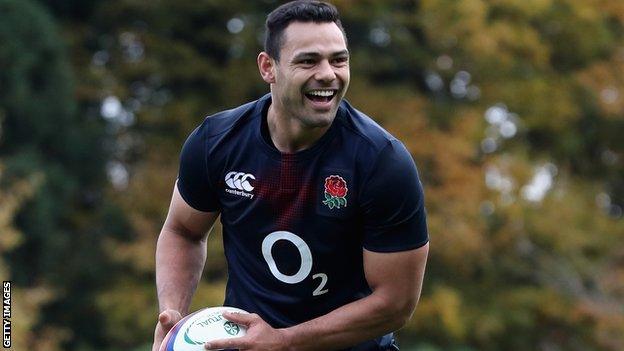
Worcester centre Ben Te'o, who has an English mother, represented Samoa in rugby league and has won two caps for England
I currently favour Wasps' Elliot Daly over Jonathan Joseph at 13 and that is solely in attack.
Daly offers one or two more options than Bath centre Joseph, who is the better defender. Daly passes more, runs different lines, runs consistently and is more inclusive with the back line, plus he can thump the ball between the sticks from over halfway, which is a great option to have.
Australia look like they will be trying to seal a Grand Slam when they face England on 3 December.
Jones has to take into account that four games is a lot of rugby to play - this autumn is like a World Cup pool stage.
He will want to keep the team fresh and I don't think they will be worried about Argentina next weekend. The Pumas look tired, they do not have the player resources and I cannot see it being a physically demanding game for England.
Jeremy Guscott was speaking to BBC Sport's Matt Davis
Subscribe to the BBC Sport newsletter, external to get our pick of news, features and video sent to your inbox.
- Published21 November 2016
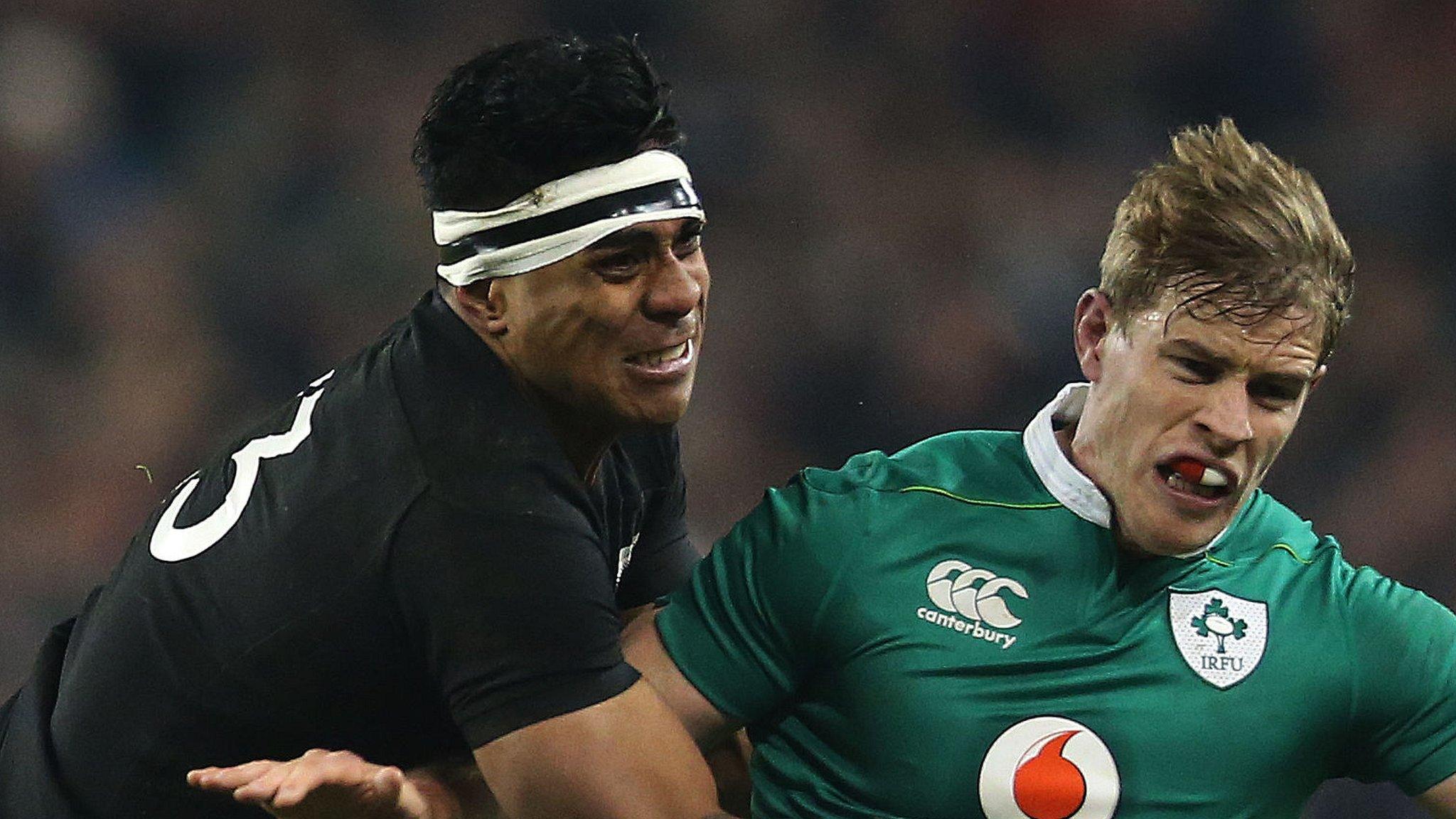
- Published20 November 2016
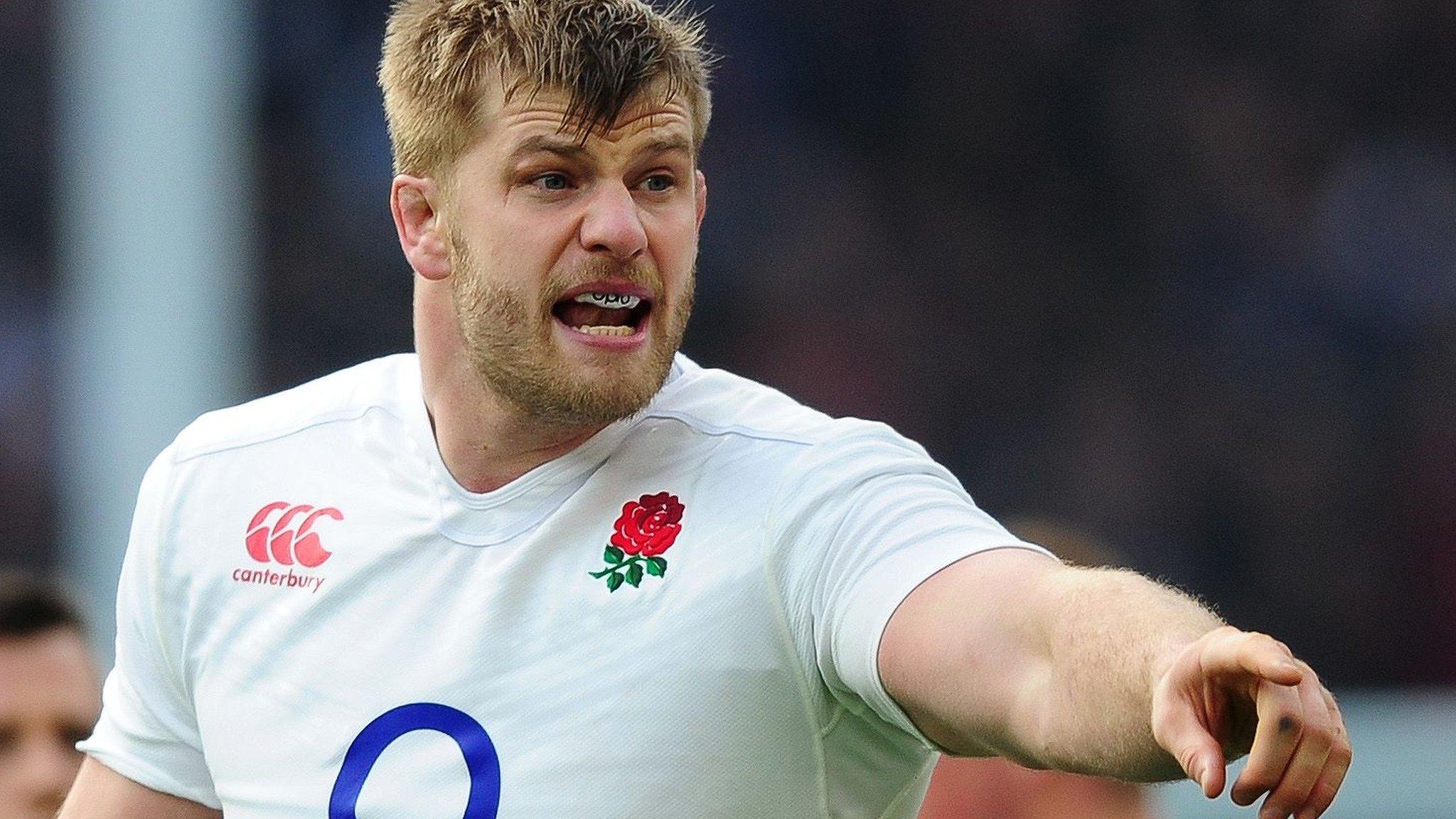
- Published19 November 2016
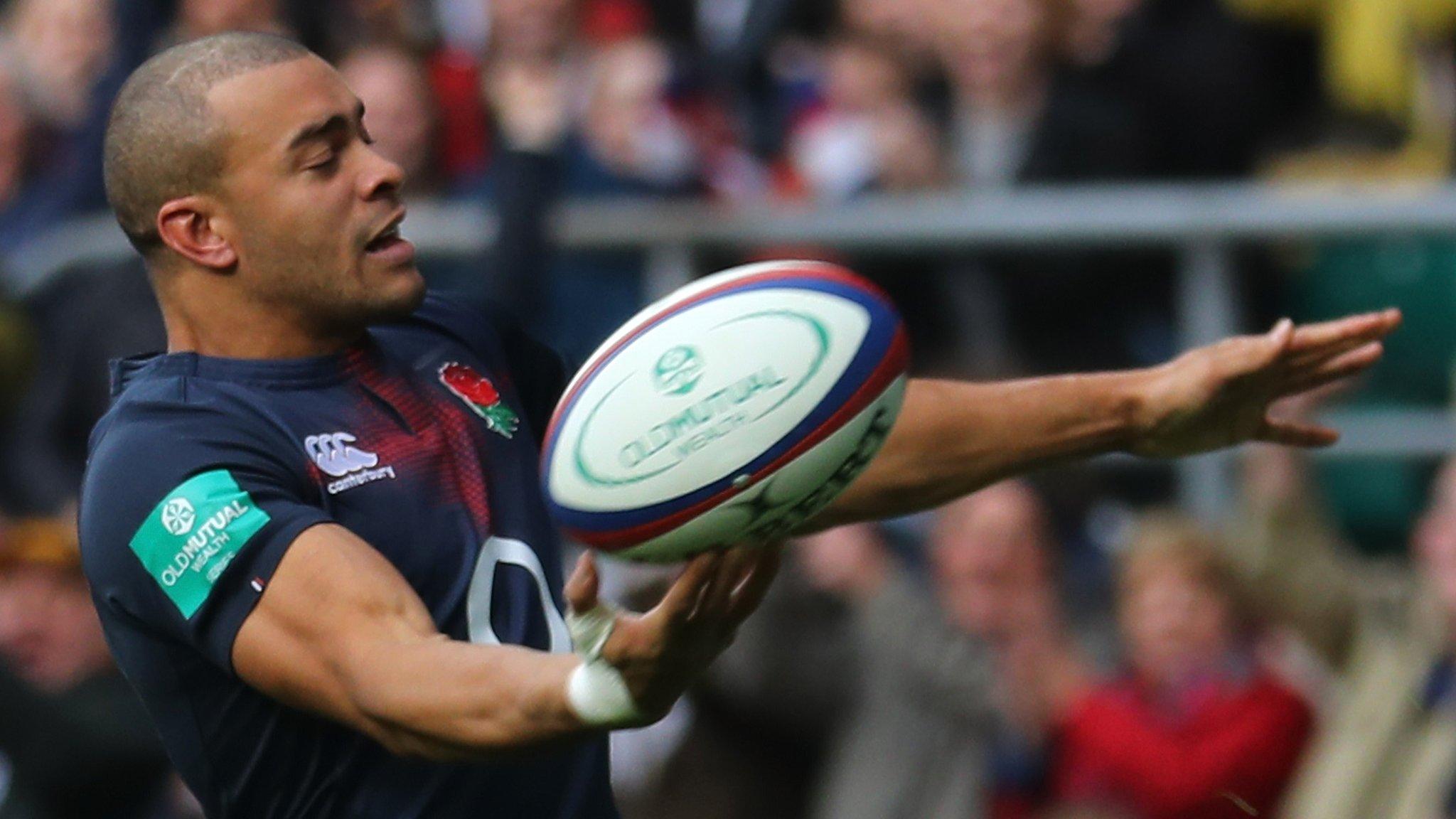
- Published19 November 2016
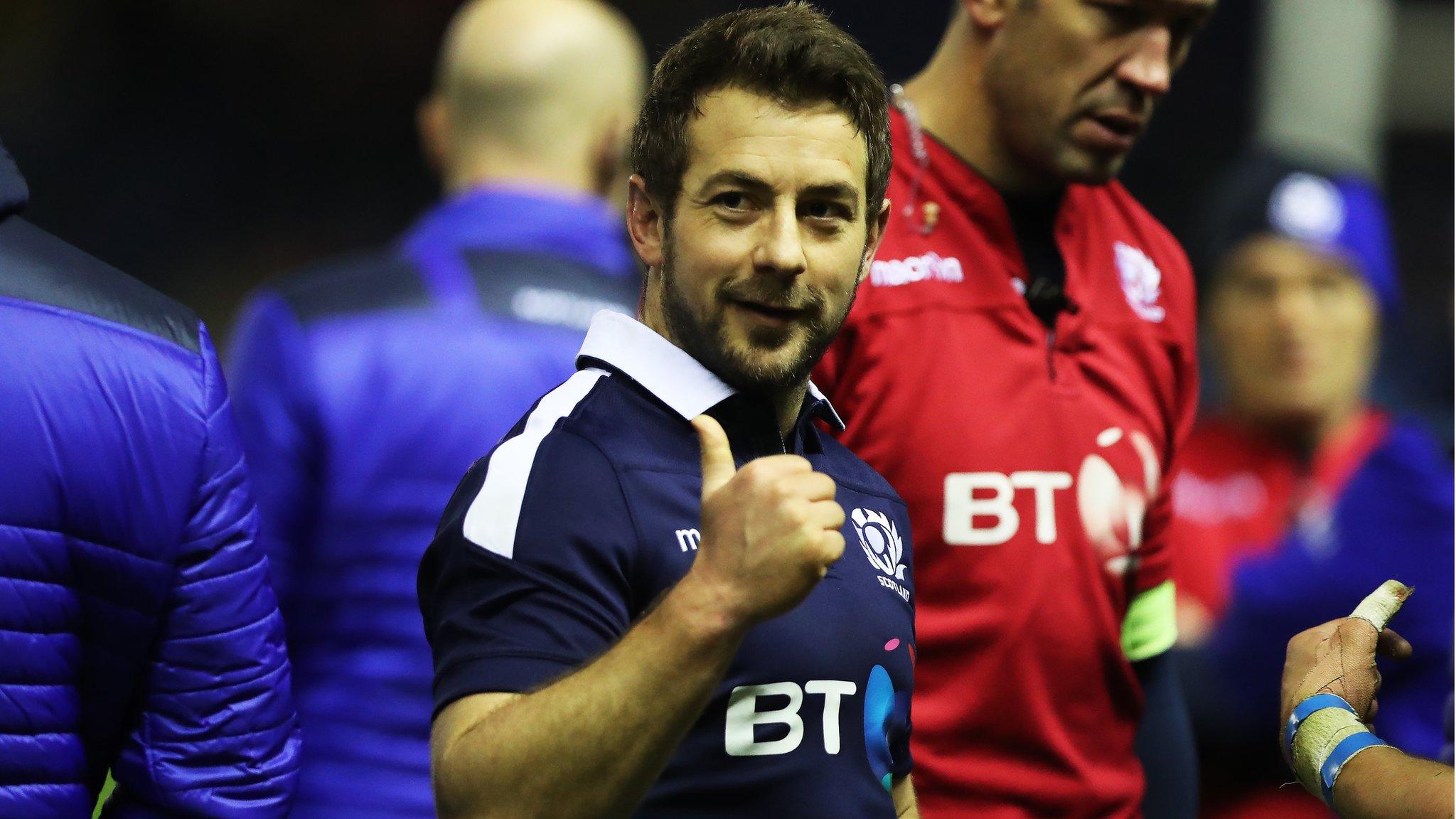
- Published19 November 2016
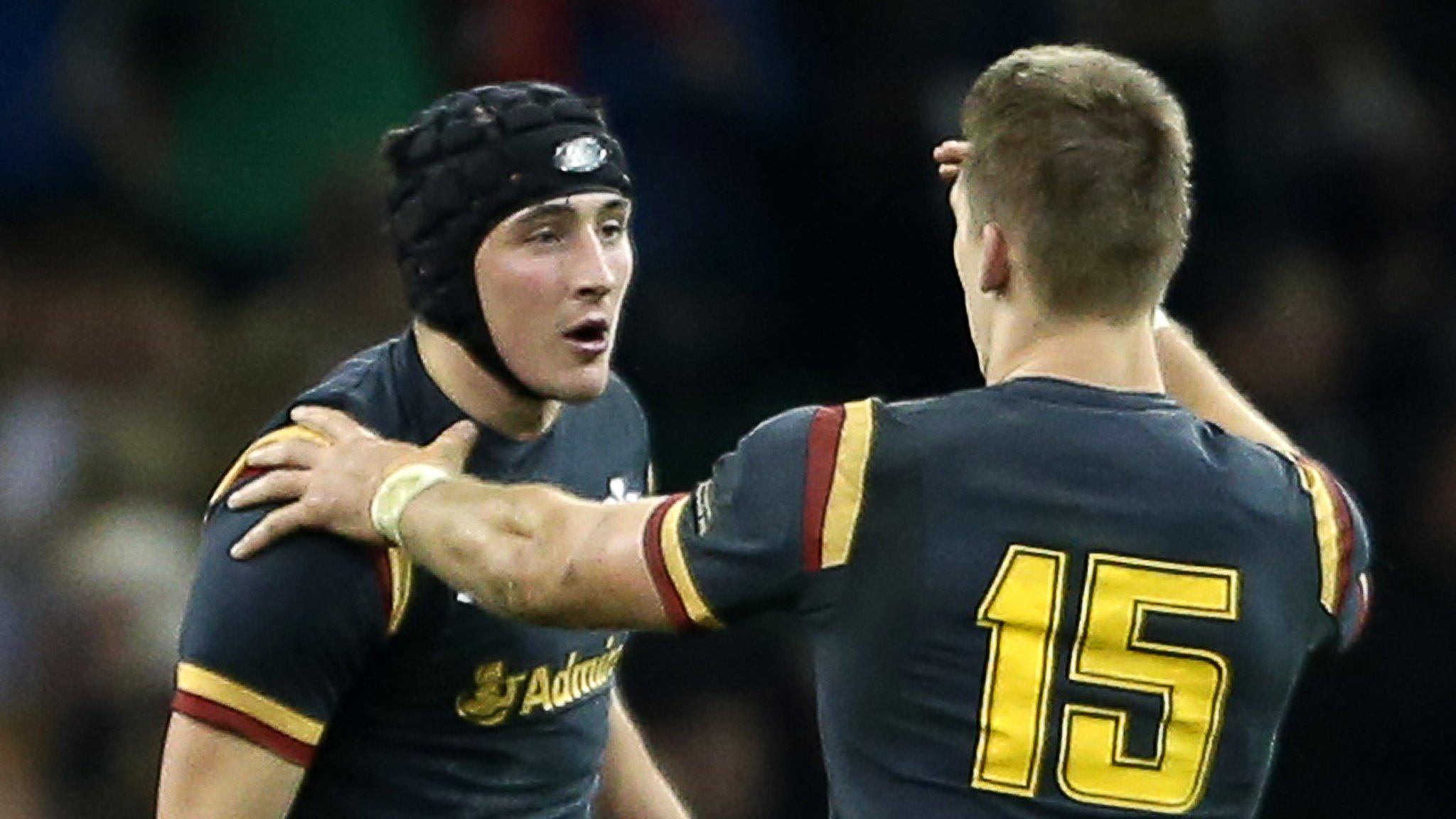
- Published19 November 2016
